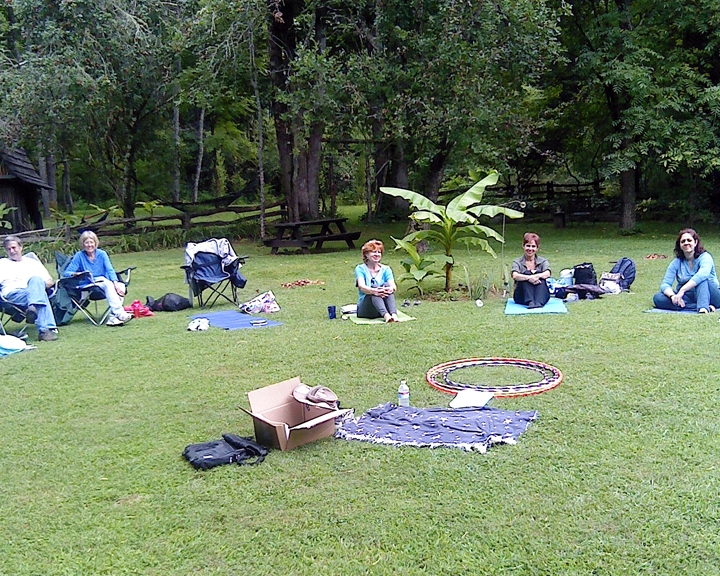To be informed of new courses by the Mindful Ecotherapy Center, and to learn of upcoming events and projects, subscribe to our newsletter.
ECOSPIRITUALITY TOPIC SUMMARY
- The “spiritual” part of ecospirituality comes from the Latin word for “breath.” Ecospirituality is not about a particular spiritual path. It is about seeking inspiration in nature and natural environments.
- The Monomyth compiled and summarized by mythologist Joseph Campbell lists the phases of the Hero’s Journey used as a template for the ecospirituality program.
- In the Call to Adventure phase of the monomyth, the Seeker realizes that things cannot go on the way the have always been, and that something must change. People who are interested in an ecospirituality program may be in this phase of their lives.
- In the Refusal of the Call phase of the Monomyth, the Seeker cannot move forward because of fear of the unknown. At this point students usually start making excuses about why proposed lifestyle changes won’t work. In this phase their thinking becomes problem-focused instead of solution-focused.
- “Supernatural Aid” may come to the Seeker in the form of a higher power, an animal totem, or simply a meaningful metaphor. In this phase, it doesn’t necessarily mean that something actually supernatural has to appear.
- The purpose of the journey of the monomyth that is ecospirituality is to learn to live fully in True Self according to your own true nature.
- The Belly of the Whale phase of the journey involves dying to your old way of being. It means letting go of old ways of being and thinking in preparation for being “reborn” into new ways of thinking and being.
- Your assumptions create your perceptions, and your perceptions create your reality.
- Katabasis is Greek for “to go down” or “to descend.” This descent is part of the Belly of the Whale phase. Katabasis in the Belly of the Whale is a way of engaging in your own ritual death and rebirth.
- Katabasis is a type of self-care. People who are natural caretakers sometimes assume that it is selfish to take time to care for ourselves. In reality, just the opposite is true. If we don’t take time for self-care, then we eventually don’t have the energy and resources to be able to help others effectively.
- The Coyote Walk meditation demonstrates the principle of mindful walking. It is a form of mindful, directed attention to a physical activity. Such attention allows you to be present in the moment.
- The Road of Trials phase of the Hero’s Journey means coming face-to-face with our own idea of perfection. There is no objective definition to the term “perfect.” Perfection means different things to different people. If you find yourself being disappointed by failing to be “perfect,” you can always change your definition of what “perfect” means.
- According to psychoanalyst Carl Jung, the Persona is the mask we wear in our everyday lives, while the Shadow represents all those traits we wish to suppress in ourselves.
- Carl Jung believed that some parts of our unconscious mind were hardwired to recognize certain symbols, just like birds are born with a migratory instinct without having to learn how to migrate. This hard-wiring causes us all to recognize things he called “archetypes.”
- The ultimate goal of ecospirituality is to live in True Self. This means living fully according to your own true nature. It’s a casting off of masks and balancing the Shadow and the Persona.
- For purposes of ecospirituality, the Supreme Ordeal phase of the journey can be conceptualized as “anything that keeps us from living in True Self, according to our own true nature.”
- Mindful acceptanceis the ability to set aside our expectations and assumptions about self and about others so that we may be more accepting of our own true selves and of the other people in our lives.
- Atonement with the Father in ecospirituality is the successful integration of the Shadow with the Persona.
- The word “apotheosis” comes from the Greek. It means, “To become divine or godlike.”
- Wise Mind is a perfect balance between Emotional Mind and Rational Mind. It is a type of apotheosis.
- “All behavior is purposeful if you understand the context.” – Alfred Adler
- The freedom to live completely and freely in True Self is the Ultimate Boon of ecospirituality.
- The Vision Quest is a time-honored rite of passage common to shamanic tribes throughout the world used to determine life’s purpose.
- We can’t always choose the circumstances of our lives, but we can always choose the story we create about those circumstances. This statement illustrates the principle of Nature as Metaphor.
- The My Own Animal Legend exercise illustrates the principle of Nature as Teacher.
- The Attitude of Gratitude exercise illustrates the principle of Nature as Healer.
- We can never truly be free to live until we come to grips with the fact that we are going to die. This knowledge gives context to our day-to-day activities and allows us to focus on what is truly meaningful instead of getting caught up in petty details.
- Intervention groups require a facilitator with more training than those for support groups.
- A group description is very important when planning a group. It allows participants to know what to expect when joining a group, thereby clarifying their goals.
- As a facilitator your goal is not to solve problems for your students. Your goal is to help them consider the pros and cons and arrive at their own solutions.
- Based on Tuckman’s model, the Performing stage of the group process conforms to the ‘Action’ stage of the Transtheoretical Model of Stages of Change.
- The stages of Tuckman’s model are:
- Forming
- Storming
- Norming
- Performing
- Adjourning
- The phases of the Transtheoretical Model of Stages of Change are:
- Precontemplational
- Contemplational
- Preparation
- Action
- Maintenance
- The correspondences between the Tuckman model and the Transtheoretical Model are:
- Forming = Precontemplational
- Storming = Conteplational
- Norming = Preparation
- Performing = Action
- Adjourning = Maintenance
- A good facilitator knows that it is possible to validate a person’s feelings without necessarily having to agree with or condone those feelings or the behaviors they generate. This means you don’t have to argue with group participants. Simply validate their viewpoint, ask them to consider the information being presented, and move on. Be aware that multiple confrontational issues by a participant could be an indicator that they might need a referral to a mental health professional.
COACHING VS. COUNSELING TOPIC SUMMARY
- Coaching interactions are more structured and task focused, involving concrete action plans designed to move clients toward their self-defined goals.
- Counseling interactions are less structured and more exploratory in nature, helping clients to achieve emotional understanding.
- Coaching interactions are driven by client-created goals.
- Counseling interactions are driven by unresolved issues and feelings.
- Coaching works to achieve specific, self-defined performance benchmarks.
- Counseling works to achieve understanding and emotional healing.
- Coaching asks, “Where would you like to be and how can you get there?”
- Counseling asks, “What’s wrong, and how can we work together to achieve healing?”
- In a coaching situation, contact between sessions is expected and encouraged.
- In a counseling situation, contact between sessions is for crisis and difficulties only.
ECOSPIRITUALITY COURSE DOCUMENTS
The documents listed below contain course description, references, and information you may find useful for the final exam.
WORKSHEETS/HANDOUTS FOR ECOSPIRITUALITY PROGRAM
If you have already completed the course materials for Ecospirituality: The Way of the Coyote, you will have already downloaded all the worksheets listed below. They are all included here for your convenience. You may download them and print them out for use with your clients as long as you don’t alter them or package them for re-sale without citing their origin.
ECOSPIRITUALITY FINAL EXAM
Please review the information above. When you feel you are ready, please click on the link below to take the final exam for this course.
When you have completed all the course material, you will be ready to take the final exam. In order to pass and earn a certificate, you must achieve a score of 80% or higher. You have unlimited attempts to achieve this score. When you pass the exam, a “Print Your Certificate” button will appear. Click on this button to save your certificate.
Upon passing, you are eligible for a free listing on the Directory page. Use the contact link to send your information if you would like this free directory listing. Please be sure to include the following information:
- Name of contact person
- Name of program
- Brief description of program/organization (250 words or less)
- A photo or logo in jpg or png format if available
- Website link if available
- Contact information


